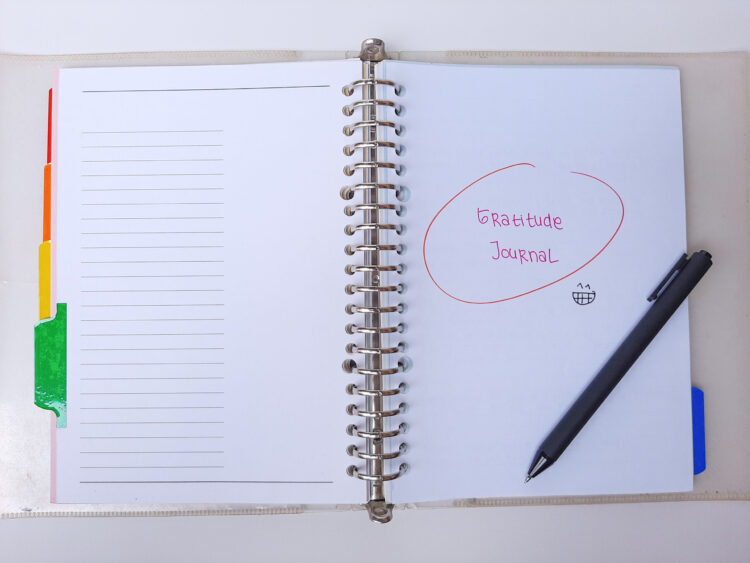Keeping a gratitude journal can transform your outlook on life. By consistently jotting down what you’re thankful for, you actively shift your focus from life’s stressors and setbacks to moments of appreciation and positivity. This simple habit trains your brain to notice and cherish the good in everyday experiences, from a warm cup of coffee on a cold morning to a meaningful conversation with a friend. Similar to positive affirmations, a gratitude journal helps improve your well-being over time. Here are some tips for how to do it.
The Power of Gratitude
Author Melodie Beattie once said, “Gratitude makes sense of our past, brings peace for today, and creates a vision for tomorrow.” What’s even more fascinating is how scientists and spiritualists alike have studied the power of gratitude and find it to be a vital expression.
Various points of research indicate that over time, practicing gratitude can help you:
- Improve mental and emotional health
- Ease chronic pain symptoms
- Develop better emotional resilience
- Foster deeper connections with others
UCLA Health also notes that “practicing gratitude—15 minutes a day, five days a week—for at least six weeks can enhance mental wellness and possibly promote a lasting change in perspective. Gratitude and its mental health benefits can also positively affect your physical health.”
Instructional organization PESI states that “a gratitude practice impacts our brain in several ways.” We provide verbatim the organization’s reasons why:
- “First, on a structural level, the practice of gratitude has been linked to two areas of the brain in particular: the hypothalamus and the left prefrontal cortex. Though small in size, the hypothalamus is mighty in function, and it impacts things like our stress level, our sleep, and even our metabolism. The left prefrontal cortex, conversely, has been linked to positive emotional states, including happiness, compassion, love, and joy.”
- “Then, on a chemical level, gratitude has been linked to several neurotransmitter systems, including serotonin and dopamine. Serotonin influences a number of bodily functions and is thought to be strongly connected to our moods. Low levels of serotonin are thought by some researchers to be linked to higher rates of depression, and gratitude may increase the levels of serotonin in our brains. Dopamine, on the other hand, is considered a ‘feel good’ neurotransmitter and plays a role in our ability to anticipate rewards and pleasure. Studies suggest that the practice of gratitude may increase levels of dopamine in our brains too.”
By keeping a gratitude journal, you actually help retrain your brain to look for and acknowledge more good in your life. It’s a similar concept to why giving back is good for you: you’re choosing an action that’s a deliberate intention to make positive changes.
5 Tips for Your Gratitude Journal
First, start with this Greater Good Science Center quiz as a guide to help determine your level of gratitude. Then, consider the following ways keeping a journal helps you notice and express it more, whether it’s for a few minutes each day or a more in-depth weekly reflection.
- Start small: Begin by writing down just one thing you’re grateful for each day. This could be as simple as a nice meal, a sunny day, or a good laugh. Keep it easy and manageable to build the habit. Even if you never do anything more than this, it still makes a difference.
- Be specific: As you get comfortable, try to add more detail to your entries. Instead of writing “I’m grateful for my friends,” specify what a friend did for you that made you feel appreciated or happy. This helps deepen your sense of gratitude.
- Set a routine: Pick a regular time to write in your journal, whether it’s first thing in the morning or right before bed. Having a routine makes it easier to stay consistent and turn journaling into a daily practice.
- Reflect on challenges: As you become more committed, challenge yourself to find gratitude even in difficult situations. Reflect on what lessons you learned or how you grew from the experience. This approach broadens your understanding of gratitude.
- Expand your entries: Finally, experiment with writing longer entries that include reflections on why certain things make you grateful or how they impact your life. You can also write letters of gratitude to people who have had a positive influence on you, even if you don’t send them. This comprehensive approach helps you cultivate a deeper sense of appreciation.
As your gratitude grows, so does your awareness of the richness in life, cultivating a sense of contentment and joy. Best of all, by journaling it, you can always look back on all the good whenever you need a reminder—a small but powerful choice to shift your perspective.
Find Whole-Person Care at Great Oaks
As an addiction rehabilitation and dual diagnosis treatment center, Great Oaks Recovery Center outside of Houston, Texas, offers a full spectrum of evidence-based practices, holistic therapies, and lifestyle modifications. We’re committed to helping you design a more full and meaningful life enhanced by better health. Talk with one of our admissions specialists today to learn why you or a loved one deserves this level of whole-person care.



